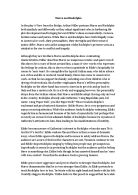This unstereotypical form of masculinity results in Roldopho being laid victim to McCarthyist views, especially from Eddie. Ever since Rodolpho is introduced to the play, Eddie is said to be ‘coming more and more to address Marco only’ because he has discounted Rodolpho as a threat to his ‘alpha male’ dominance, due to his ‘high tenor’ voice and ‘blond hair’, even though submissively, Rodolpho is the biggest threat to his control. This is due to Eddie’s view as Rodolpho being ‘ain't right’ and a ‘punk’ meaning that, just because of his behaviour and appearance, Eddie believes he is a homosexual, and in turn, not a suitable partner to his beloved niece. However, Rodolpho is also heavily susceptible to McCarthyist views from the audience, purely because of the fact that he is the only male figure in the play who essentially stands out from the crowd, due to his unstereotypical features. The audience may also perceive Rodolpho as not being ‘right’ and in fact, the audience’s perception of Rodolpho changes from positive to possibly negative by the end of the play. At his entrance, he is seen to be an innocent young man, who wants to be a ‘citizen’, but as the play progresses, the audience begins to change their opinion of Rodolpho, as he says ‘I will not marry [Catherine] to live in Italy’ and that ‘he nods to [Eddie] testingly’ to provoke him. Suddenly, the McCarthyist judgements of Rodolpho change and he is moreso viewed as an unsympathetic character who fills Eddie’s doubts of ‘bowin’ to his papers’. In addition, the fact that Rodolpho is said to nod ‘testingly’, possibly also suggests that this is a sort of judgement of Eddie from above, causing him to reveal his fatal flaw. This is a progressive change of view throughout the play Miller, as a victim of McCarthyism himself, uses Rodolpho to symbolise the requirement for prejudice to end, but that also, people can quickly change their perceptions of you depending on your behaviour.
Rodolpho is portrayed by Miller as a character who avidly follows the delusion of the American Dream. He comes to America with the aspiration of buying a ‘blue motorcycle’ and wanting to see the ‘lights’ and ‘Broadway’. He and Marco also say that they want to buy ‘their own house’ showing how they have the belief that they will be able to make a decent living from what is essentially a working class job. In fact, the fact that he says to Catherine ‘I will not marry you to live in Italy, shows that he is possibly such an obsessed follower of the American Dream that he he is willing to simply marry for a ‘green card’ citizenship, and Rodolpho’s possibly fabricated love for Catherine is the reason for most of the events in the play, and ultimately, Eddie’s death. However, Rodolpho’s belief in the American Dream begins to deteriorate as the play progresses, as seen when he says that ‘the only wonder is the work’ in America, which heavily contrasts to his previous statements of wanting ‘to be an American’. The fact that Rodolpho becomes more focused on the requirement for work and earning money compared to his initial desires of living the American Dream, shows that he is possibly maturing as the play goes on and that he is possibly also becoming more confident in his ability to stay in America as a citizen. Miller, whose family suddenly became poor during the Wall Street Crash, knows the realities of the American Dream, and uses Rodolpho’s effects on Eddie as a tool to showcase the consequences of blindly following the American Dream, and doing everything you can to achieve it.
Overall, the significance of Rodolpho in A View from the Bridge is that he is used by Miller to portray the need for society to accept that times are changing, and to not persecute people due to whether or not they fulfill a stereotype. Rodolpho is also used by Miller to display the consequences of McCarthyism and prejudice, and furthermore, he is used by Miller to signify the consequences of following a delusion such as the American Dream, and of being in denial of the fact that it doesn't exist.








